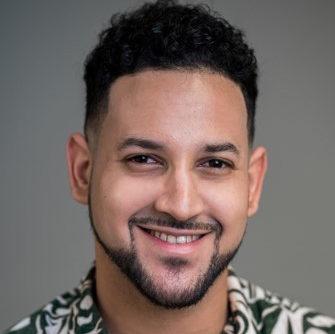
This community planner wants to design a more inclusive Jewish world
By Justin Regan
Every artist has their canvas. For community planner Justin Orlando Fair, that canvas is the city and people of Baltimore.
For him, the art of urban planning is more than just prettying up the town he was raised in. It’s about using the craft as a means to bring social change, be it with tiny homes or Shabbatons.
“For me, it’s about having symbols in your environment that reaffirm your right to exist and people have got your back,” said Fair, who is a member of Beth Am.
Fair is a project manager at the Maryland Department of Housing and Community Development and has a master’s degree in city and regional planning from Morgan State University. He is also involved with a plethora of organizations (Jewish and non-Jewish) that focus on building community and equity.
The calling is a personal one. Fair grew up in a multiracial household — his mother, an Ashkenazi Jew; his father, Black — and has family that was affected by the infamous “highway to nowhere,” a failed public project that demolished hundreds of West Baltimore homes and displaced thousands of its residents. While Fair’s grandmother’s house was spared by a block, the neighborhood was not.
“Technically my father’s generation as kids saw multiple neighborhoods get demolished,” Fair said. “To then see an infrastructure program that didn’t do anything with it, it means you have an entire generation that either feels empowered or doesn’t, and you have to fix that. It requires innovation and it requires energy. That’s why when it comes to social justice, we are talking about everyone.”
Fair throws his innovation and energy (lots of energy) into a style of urban planning that is more people-focused. A cornerstone of his research and advocacy is tiny homes. He said they can be a useful option to increase affordable, sustainable housing. Fair envisions a future where enough tiny homes can be built to create “pocket neighborhoods,” which can help revitalize areas that have been hit hard by neglect and inequality.
“Baltimore is a city of row homes, so we already have alley homes and alley clusters, many of which were demolished between 1920 and 1970 due to ‘blight,’” Fair said. “Already you have small structured plots that are already well-situated for small houses because technically, as far as zoning goes, they are already meant for that purpose.”
Fair also sees a lot of promise in younger generations, but believes there must be action to capitalize on it. One way Fair and his husband have done this is by founding Unmatched Athlete, a nonprofit that encourages LGBTQ youth to become involved in sports. The organization is having a field day event June 12.
“We want to create a path for queer student athletes to be prepared and be supported for collegiate sports,” Fair said. “That way they can go on and become the next Michael Phelps, all the kids like myself growing up. I was just steered away from sports. ‘Oh, you’re sensitive.’ It’s code for ‘You’re gay’. It’s code for ‘You shouldn’t do this.’ If you want to change people’s perspectives and you want to show not tell the importance of progress and inclusion and open-mindedness, you have to teach kids that.”
Fair credits his parents for raising him with a dedication to social justice.
“A lot of that means I was raised with warm, loving people around me who did not care about the difference of skin color or the difference of religion,” Fair said. “As long as you had a common set of beliefs you could agree with one another and a sense of love in your heart.”
Outside the family, things could be more difficult, Fair said. Growing up, he struggled in Jewish spaces as a Jew of color. At one point the prejudice he faced made him not want to engage with the wider Jewish community, but he always stayed in touch with his Jewish values.
“My dad would always say when I didn’t make sense, that I was being confused and someone was trying to put words in my mouth,” Fair said. “And he would also say, ‘Don’t let other people steer you in the wrong direction.’ Because my brother and I grew up around a bunch of non-Jews and a bunch of diversity in that regard, I think in many ways, it was taking my little book of Jewish values that I was given after I graduated from Hebrew school, internalizing what it means to have Jewish values and recognizing that my self-identity is a matter of honoring and appreciating my ancestors.”
Fair and his husband are currently involved with Beth Am, where he used to run the young adult social program. He said the synagogue is committed to serving interreligious families, LGBTQ Jews and Jews of color.
In addition to Beth Am, Fair has also brought his Jewish values to organizations like The Associated’s Baltimore Partnership Committee. He’s worked with Harriette Wimms in strengthening the Jews of color community in Baltimore and (thanks in part to the virtual nature of the last year) around the world. This included a virtual Jews of color Shabbaton over Shavuot, which Fair said left him in tears.
“I really loved that I could look around and see ethnic and racial diversity,” Fair said. “Because it’s not just enjoying the religion alone, it’s enjoying the fact that all these people have different foods and different language styles and live in different places. I guess people are very proud of the families they build because when you come from adversity and people denying you for things you normally don’t think would be deniable, you cherish what you got. So it was really great to look around and feel that … kinship amongst people. It was a reminder to me that I’m not alone.”
Fair said, while the Jews of color community is growing and becoming more included by the larger Jewish community, there are still plenty of struggles to overcome, especially when it comes to being seen as fellow Jews and not just as “unique.” He said many individuals might not be involved in any synagogue, and it’s important to reach out to them as well.
“When you got populations and congregations that are moving further apart, or different congregations working online, we’re seeing just how diverse and speckled the Jewish population is across the city,” Fair said. “But I don’t think we have enough third party hangout spots.”
Fair credits places like the Jewish Museum of Maryland and the Gordon Center for Performing Arts for being places to congregate without the congregation. But he said there needs to be more. Like a good urban planner, he believes an increase in these “third spaces” is how different people can meet and get to know each other. Fair also said sometimes the best way for people to learn from one another is to try something different.
“My other answer is break out of your mold and go with a group of friends,” Fair said. “Go with another family to another restaurant to another congregation to another event you wouldn’t normally go to. It’s always easier for us to change someone else than it is for us to change ourselves. If you do it with somebody you’re more likely to enjoy yourself.”
And for Fair, the man of many hats, even he thinks there’s more canvases out there for him to work with.
“I finally feel comfortable in my skin,” Fair said. “Now that I’m comfortable, like the cicadas, I want to shed it and fly around and experience things and I’m ready for this pandemic to be over.”
Justin Regan is a freelance writer for the Baltimore Jewish Times. He produces the American Rabbi Project podcast.







